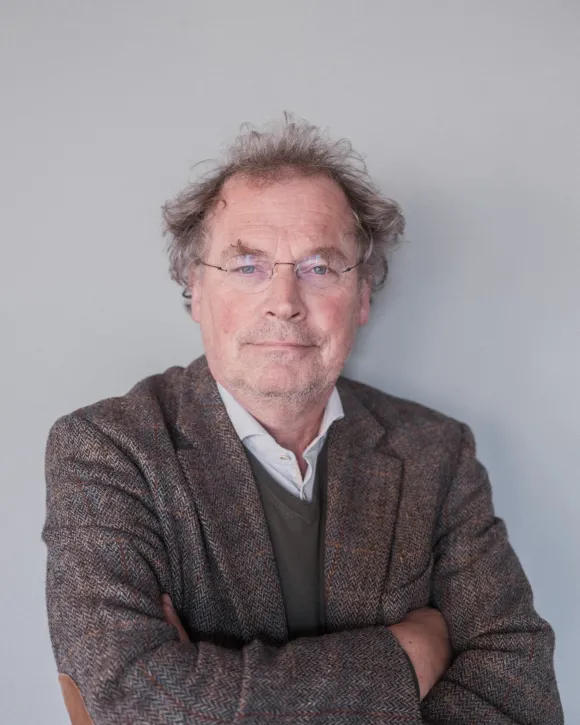New Dean of FFTR faces towering budget cuts: ‘Impact on the staff is existential’
-
 Het Erasmusgebouw. Foto: Johannes Fiebig
Het Erasmusgebouw. Foto: Johannes Fiebig
With a budget cut of 10%, the Faculty of Philosophy, Theology and Religious Studies will be hit hardest financially of all faculties. Bert van den Brink, Dean as of 1 July, is facing a tough challenge.
Nijmegen is not unknown territory for Bert van den Brink. In 1984, the new Dean of the Faculty of Philosophy, Theology and Religious Studies (FFTR) started studying theology at what was then known as the Catholic University of Nijmegen. Two years later, he moved to Utrecht to study philosophy.
‘Philosophy appealed to me even more than theology, and my social circle was mainly in Utrecht,’ says Van den Brink in a meeting room on the 14th floor of the Erasmus building, as he is still waiting for an office of his own.
Major challenges
Following an academic career with various board positions, most recently as interim vice dean at Utrecht University, the professor of political and social philosophy is now back in Nijmegen. ‘When I was asked if I was interested in this position, it felt like an opportunity to return to my substantive roots.’
‘Governance fascinates me, and this Faculty plays a crucial role in stimulating reflection – among students, staff, and in the public debate. It is a place where fantastic teaching and research takes place. The choice to apply was therefore quickly made.’
As he only starts as dean on 1 July, Van den Brink apologises for not yet being able to answer some questions in more detail. Still, he is not shying away from dialogue. ‘We are facing major challenges.’
Budget cuts are hanging like dark clouds over universities. It doesn’t seem like an ideal time to step in as dean.
‘It’s true that these cuts were not an issue five years ago. But if I had started then, I would have had to deal with the Covid-19 pandemic, which was not an easy time either. Meaning that there is always something to be concerned about.’
‘The financial challenges are great, both at the Faculty of Philosophy, Theology and Religious Studies and within the wider university landscape. This forces us to be more critical, and to make choices. This kind of period can also be an opportunity to make the organisation more resilient.’
What is the atmosphere at the Faculty when it comes to the cuts?
‘My real introduction round has yet to begin, but I suspect it will be similar to the situation at Utrecht University, where I worked until recently. I understand what that news is doing to the staff: the impact is existential as it concerns jobs and career opportunities.’
What role can the Dean play in coping with budget cuts?
‘Continue to communicate what the Faculty stands for, but also be realistic about what is possible. The humanities are facing major challenges. The cuts are hitting our disciplines relatively hard, partly because it is sometimes difficult to clearly communicate our value to society. We need to work together to find forms that better illustrate why our study programmes matter. As a Dean, it is my job to drive that conversation.
‘One of our tasks is to make study programmes more future-proof – for example by looking into broader, interdisciplinary programmes. And by looking at topics with new eyes. The social role and significance of religion, for example, is currently on many people’s minds. But the student intake for this kind of study programme is declining across the country. Especially at Radboud University, we must continue to search for a narrative in line with the zeitgeist that captivates young prospective students.’
In an open letter signed by more than 300 students, staff, and alumni, members of the student participational bodies write that of all the faculties, the Faculty of Philosophy, Theology and Religious Studies will be hit hardest financially. They ask the Executive Board for financial support and administrative concessions. Were you also asked to sign the letter?
‘No.’
Would you have signed it if had you been asked to?
‘Probably not. Not because I disagree with the content, on the contrary: it is a well-worded letter expressing values that I largely agree with. But it is an initiative by staff and students. My role as Dean is to guide the process they advocate, together with the other deans and the Executive Board.’
Political philosopher
As a political philosopher, Bert van den Brink is fascinated by the question of how people relate to a world in which they no longer recognise themselves. ‘Whether it is activism, conspiracy theories, or sovereigns withdrawing from society – these are all ways of coping with social alienation.’ Van den Brink explores the strategies people develop to balance personal and collective life, especially where the two are hard to fit together.
‘At the same time, I am still slightly remote, as a newcomer from outside. I cannot oversee exactly how the negotiations with the Executive Board are going, but it is clear that all faculties have to take a position in relation to that Policy Letter and the Board.’
Is the 10% budget cut for the Faculty of Philosophy, Theology and Religious Studies mentioned in the Policy Letter a given? Are you planning to appeal to the Executive Board to reduce this proposed cut?
‘I don’t yet know enough about the details of the discussion to be able to say with any certainty what a fair percentage would be. But more important than the figure is the story behind it: what is at stake when you apply such percentages? The discussion should actually not be about the spreadsheet, but about what we want to continue to do at this Faculty when it comes to teaching, research and community engagement. Only then can we start to look at figures.’
Do the smaller study programmes at this Faculty need to attract more students to remain viable?
‘Ask me again about the details in three months’ time, but as a rule: too low intake figures impact study programmes on multiple fronts. If the income from tuition fees and the government contribution falls away, you quickly reach the limits of what is possible. Small study programmes have to account for their student numbers every year, and that is tough on the people working there. This is precisely why it is important to be really clear about where you want to go in terms of content, where you can innovate, and how to future-proof the story of the study programme.’
Last autumn, the Administrative Director told Vox that it would be quite a challenge to achieve a zero budget by 2027. How does the Faculty currently stand in this regard?
‘The challenge has, I think, become even greater. We need to talk with the Executive Board, internally but also with other faculties, about how to achieve this. That it is a huge challenge and it seems obvious to me that it will have consequences. That is all I can say about it at the moment.’
In the same interview, the administrators at the time said that a merger with the Faculty of Arts was not excluded as far as they were concerned. How do you stand on that?
‘I have no strong opinions about it. If a merger with the Faculty of Arts is demonstrably offers more benefits in terms of content and finances than it costs, it should not be ruled out. Other universities in the Netherlands have opted for a broad humanities faculty. But you could also consider renewing the old reflection assignment of the Faculty of Philosophy, Theology and Religious Studies, and extending it to Radboud University as a whole, or even look more broadly at collaborating with social scientists. We certainly live in times that call for clarity and future perspective, so those conversations will probably also take place in the near future.’
‘I value collaboration with the participational bodies’
As in all faculties, there is a vacancy freeze at Faculty of Philosophy, Theology and Religious Studies. Employees who retire are not being replaced. In addition, lecturers are dropping out.
‘Fewer people means a higher workload; that is inevitable. The challenge is to organise the work so that it remains manageable. This is already being explored within the Faculty, for example by redesigning teaching or better coordinating study programmes. Keeping the workload in check requires flexibility, also in what we offer. At the same time, we have to be vigilant about safeguarding quality.’
What are you most looking forward to in your new position?
‘I do value collaboration with the participational bodies, open dialogue and accountability. Differences of opinion are allowed and necessary, but what matters is that decisions are made in a transparent manner so that everyone can ultimately identify with them, even if they disagree. I also look forward to meeting our students, because at heart, I am a lecturer.’




